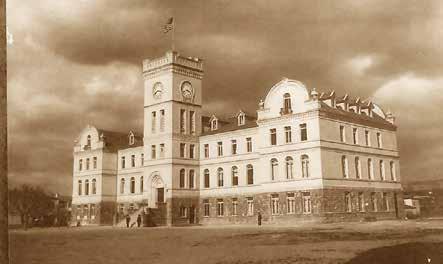
5 minute read
Peace Making is not a Sprint
Courtesy of: mybeirutmarathon.com

The following is a true story of perseverance, faith and determination. It is a story of a woman who overcame all odds, to draw the Lebanese from all walks of life, factions, and sects into a peaceful run. From her hospital bed and with a fate yet unknown, May El-Khalil, launched and organized the very first marathon ever held in Beirut. Some call it a miracle, some don’t believe. But only El-Khalil knows the truth. For from the very beginning, there was a guiding hand….
May El-Khalil, an IC grandmother and wife of IC graduate, Faysal El-Khalil ‘65, was what you called a housewife with a flair. The mother of four children (one of whom, Sari ‘03, is an IC Alumni) held cultural events at her home, gave aerobics classes and participated in every sport available.
After 23 years in Nigeria, she was greatly enjoying her return to Beirut only two years earlier. She was already an avid runner in Nigeria and would spend her evenings jogging along the African roads with her husband, Faisal.
On the Corniche, she smiled broadly at everyone as she ran along the sea boardwalk.
But this utopic scene would suddenly come to an abrupt and gruesome halt in 2001.
It was a rainy and gloomy day that early morning of November 17th. ElKhalil considered skipping her run. But pure will forced her to get out of bed and don her running shoes.
The skidding van seemingly came out of nowhere and crushed her ferociously against a wall. She vaguely remembers dropping to the ground. Then everything went blank.
Her memories are hazy but she distinctly felt a certain peaceful pull. It was strangely comforting. It felt wonderful to just let go. But something inexplicably held her back.
Ten days later, she opened her eyes to wires and machines which seemed to be hooked to every part of her body. She met the worried eyes of her family’s.

And then it came out of nowhere. “If I live, I want to do a Marathon,” she declared.
It wasn’t what one expected as a first sentence right out a coma. Still, her distraught family pledged their support. But the truth was that El-Khalil may not make it.
Both femur bones were broken, her hips were fractured and there was serious tissue loss.
For the first few months, El-Khalil was placed flat on her back with fixators on both legs and hips. It was agonizing pain, both physically and spiritually.
Meanwhile, word spread about her horrendous accident.
In the year that she remained hospitalized in Beirut, El-Khalil had visitors every single day. Many of them, people she didn’t know. They had just seen her running every day.
And then, one day, a young paraplegic man rolled in on his wheelchair. “I was in a car on the day of my graduation from university,” he told her. “Life doesn’t end here. There is so much to look forward to.”
Touched by such intense support, ElKhalil dismissed any weak prognosis. “I refused to be a victim,” she said quietly. “Do not ever pity me. I am here for a purpose. If I cannot run marathons anymore, then I want to make sure that others could.”
Launching a marathon in Beirut became her main preoccupation. Almost an obsession. She strongly felt that a marathon could bring together a country divided for decades by politics and religion, even only for a day.
A few weeks into her hospital stay, she asked to see a representative from the Ministry of Sports and Youth. “I want to hold a marathon in Beirut,” she told him simply. The representative agreed.
And the rest, as they say, is history. From her bed - and between operations - El Khalil put together a committee and started organizing the event. A year later, she was transferred to a hospital in Miami. There, she underwent yet more surgeries and started rehabilitation. Defying all odds, El-Khalil began to make a remarkable discovery. She spent countless hours training herself. “I was
an avid athlete once,” she said. “I knew that I had a strong body. I can and I will walk again.”
Fifty-two units of blood and 36 major operations later, El-Khalil was able to hobble along crutches. Upon her return to Beirut, she immediately visited political and militia leaders all over the country. “Everyone had to be in on this,” she said.
On October 19th, 2003 over 6000 people showed up to the starting point in downtown Beirut. People from all religions stood side by side at the starting line as El-Khalil, on her crutches, looked on.
“Peace making,” she said, “is not a sprint. It is more of a marathon”. (This continues to be her mantra and is boldly written on her office wall).
“The accident was a turning point in my life,” she says today as she prepares for the 14th Beirut Marathon. “I had met my destiny that day. Now I understand that when things must happen they will happen. I was sent back for a reason.”
The Beirut Marathon has become the largest running event in the Middle East. Despite the continuous political turmoil, the Marathon has been held every year, still bringing together all political and sectarian factions.
In 2011, the Laureus World Sports Academy awarded El-Khalil with its Sport for Good Award. In 2013, El-Khalil spoke at the TED Global Conference in Edinburgh, Scotland. The video of her talk has since reached almost 4 million views. In 2014, she received the Fair Play for Peace Award by the Premio Fair Play Mecenate in Italy.
Today, the Beirut Marathon Association organizes the yearly Youth Race, Women’s Race, and the Beirut International Marathon.
The message remains the same: moving and uniting people through the sport of running.











